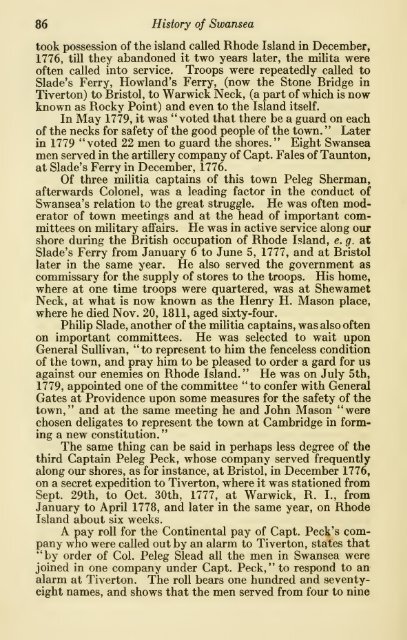History of Swansea, Massachusetts, 1667-1917; - citizen hylbom blog
History of Swansea, Massachusetts, 1667-1917; - citizen hylbom blog
History of Swansea, Massachusetts, 1667-1917; - citizen hylbom blog
Create successful ePaper yourself
Turn your PDF publications into a flip-book with our unique Google optimized e-Paper software.
86 <strong>History</strong> <strong>of</strong> <strong>Swansea</strong><br />
"<br />
took possession <strong>of</strong> the island called Rhode Island in December,<br />
1776, till they abandoned it two years later, the milita were<br />
<strong>of</strong>ten called into service. Troops were repeatedly called to<br />
Blade's Ferry, Rowland's Ferry, (now the Stone Bridge in<br />
Tiverton) to Bristol, to Warwick Neck, (a part <strong>of</strong> which is now<br />
known as Rocky Point) and even to the Island itself.<br />
In May 1779, it was "voted that there be a guard on each<br />
<strong>of</strong> the necks for safety <strong>of</strong> the good people <strong>of</strong> the town. " Later<br />
in 1779 "voted 22 men to guard the shores." Eight <strong>Swansea</strong><br />
men served in the artillery company <strong>of</strong> Capt. Fales <strong>of</strong> Taunton,<br />
at Slade's Ferry in December, 1776.<br />
Of three militia captains <strong>of</strong> this town Peleg Sherman,<br />
afterwards Colonel, was a leading factor in the conduct <strong>of</strong><br />
<strong>Swansea</strong>'s relation to the great struggle. He was <strong>of</strong>ten moderator<br />
<strong>of</strong> town meetings and at the head <strong>of</strong> important committees<br />
on military affairs. He was in active service along our<br />
shore during the British occupation <strong>of</strong> Rhode Island, e, g. at<br />
Slade's Ferry from January 6 to June 5, 1777, and at Bristol<br />
later in the same year. He also served the government as<br />
commissary for the supply <strong>of</strong> stores to the troops. His home,<br />
where at one time troops were quartered, was at Shewamet<br />
Neck, at what is now known as the Henry H. Mason place,<br />
where he died Nov. 20, 1811, aged sixty-four.<br />
Philip Slade, another <strong>of</strong> the militia captains, was also <strong>of</strong>ten<br />
on important committees. He was selected to wait upon<br />
General Sullivan, "to represent to him the fenceless condition<br />
<strong>of</strong> the town, and pray him to be pleased to order a gard for us<br />
against our enemies on Rhode Island." He was on July 5th,<br />
1779, appointed one <strong>of</strong> the committee "to confer with General<br />
Gates at Providence upon some measures for the safety <strong>of</strong> the<br />
town," and at the same meeting he and John Mason "were<br />
chosen deligates to represent the town at Cambridge in form-<br />
ing a new constitution.<br />
The same thing can be said in perhaps less degree <strong>of</strong> the<br />
third Captain Peleg Peck, whose company served frequently<br />
along our shores, as for instance, at Bristol, in December 1776,<br />
on a secret expedition to Tiverton, where it was stationed from<br />
Sept. 29th, to Oct. 30th, 1777, at Warwick, R. I., from<br />
January to April 1778, and later in the same year, on Rhode<br />
Island about six weeks.<br />
A pay roll for the Continental pay <strong>of</strong> Capt. Peck's company<br />
who were called out by an alarm to Tiverton, states that<br />
"by order <strong>of</strong> Col. Peleg Slead all the men in <strong>Swansea</strong> were<br />
joined in one company under Capt. Peck," to respond to an<br />
alarm at Tiverton. The roll bears one hundred and seventyeight<br />
names, and shows that the men served from four to nine

















